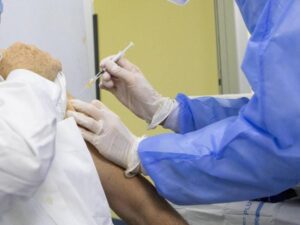How scientific is the delay of the Corona second dose in Canada?

Toronto, April 6: According to a recent report in the British Medical Journal and the World Health Organization, the way in which the second dose has been delayed to bring more people in Canada under the immunization program to prevent rapid corona transmission is not scientific at all.
The reason, to that editorial in the British Medical Journal, is: “This is consistent with antibody surveillance data from the React-2 study, which showed IgG positivity 21 days after one dose of Pfizer-BioNTech vaccine in 80% of adults under 60, but in only 49% and 34% of those aged over 70 and 80, respectively. IgG positivity increased to 93% and 88%, respectively, after a second dose, suggesting that the second dose is critical in these vulnerable age groups.”
In addition, Pfizer never guaranteed maximum performance. Concerns about the elderly remain until the second dose is given. However, in the case of AstraZeneca, long-term efficacy has been observed. In the case of Pfizer, Public Health England data show that efficacy against the symptomatic disease was 57% among adults over 80 after a single dose, increasing to 85% after the second dose.
And according to the World Health Organization, the second dose of the Pfizer BioNTech vaccine should be given between 21 and 28 days. However, depending on the situation, it can be given at intervals of a maximum of 6 weeks.
The U.S. Centres for Disease Control and Prevention said months ago that people could wait up to 42 days between doses, if necessary, though the agency still advises individuals to stick to the initial schedule. On the other hand, Thomas Denny, chief operating officer of the Duke Human Vaccine Institute, said The first dose of the Pfizer vaccine reduces infections by about 50 percent, and Moderna’s jab reduces it by around 80 percent, but both shots offer 95 percent protection after the second shot.
On the other hand, Paul Bieniasz, a retrovirology at Rockefeller University, said that those who have been partially vaccinated are more susceptible to the more dangerous variants. That is a real concern. He made it clear to Scientific American that, “The virus is going to evolve in response to antibodies, irrespective of how we administer vaccines. And the question is: would we be accelerating that evolution by creating country-sized populations of individuals with partial immunity?”
It also indicates that the AstraZeneca vaccine may be delayed, but not in the case of the Pfizer and Modern vaccines, as their mRNA may be degraded. Because, in the view of the Food and Drug Administration of the United States, the issue of taking the dose of vaccine is quite succinct and it should be in accordance with the appropriate instructions.
The question then is, why is the Canadian government ignoring the advice of other health organizations and medical journals and not giving it to the public in a timely manner?


